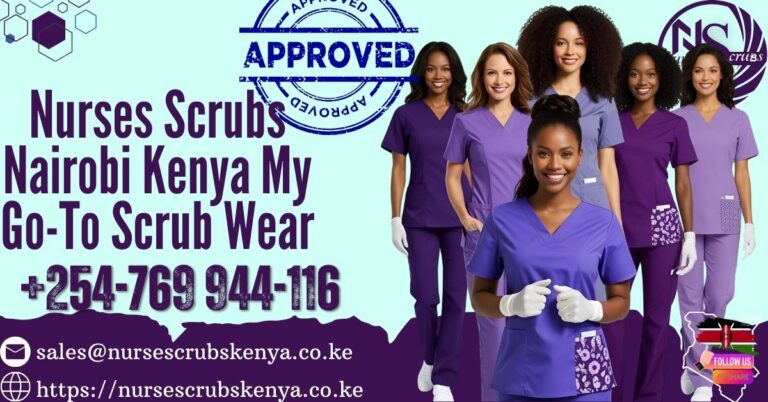
What jobs wear scrubs?
If you’ve spent any time in or around a hospital or even just watched a few episodes of a medical drama. you’ve probably noticed one thing: scrubs. They’re everywhere. But here’s the thing. Not everyone wearing scrubs is a nurse, and not everyone in healthcare wears them. Surprising, right?
It raises a question that people don’t often ask out loud: Who actually needs to wear scrubs—and why?
Let’s get into it.
Scrub-Wearing Professions in Kenya: Roles, Reasons & Workplaces
Scrubs aren’t just uniforms. They’re practical tools of the job, a statement of identity, and, if we’re honest, a bit of armor in sometimes unpredictable environments. In Kenya, where healthcare workers often operate in high-pressure conditions, scrubs aren’t just for looks. They’re part of the system.
So, who wears them?
Dentists

Dentists definitely wear scrubs, but here’s a twist, not all of them used to. A few years back, I remember visiting a dental clinic in Nakuru where the dentist wore a full white coat over dress trousers and a shirt. It looked professional, yes! But not exactly hygienic for hands-on procedures.
Now, most dentists in urban clinics go for tailored scrubs. Easy to clean, breathable, and still professional. Plus, let’s be honest, dental procedures can get messy. You want an outfit that handles that well.
Nurses
Ah, the classic association. If you think of scrubs, you probably picture a nurse. Fair enough. But it’s worth noting that scrubs aren’t exclusive to them. Still, for nurses, they’re essential.
A nurse at Kenyatta National Hospital once told me that she can’t function in anything else. “Even if we had an option,” she said, “scrubs make it easier to move fast, bend down, or carry equipment. Plus, you know, it’s washable after blood spills. Or worse.”
Comfort, mobility, and hygiene all rolled into one outfit? It’s no wonder scrubs have become synonymous with nursing. Better looking in complete set of scrub pants and tops!!

Caregivers
Here’s a group that often gets overlooked. Caregivers especially those working in private homes or elder care facilities—need the same practical benefits. In Eldoret, there’s a home care center where all caregivers wear light green scrubs. It’s more than a uniform. It’s a message to the families: We take hygiene seriously.
And that’s not just fluff. Scrubs made with antimicrobial fabric help protect not just the patient, but also the caregiver, from passing infections.
Medical assistants
This role isn’t always clearly defined in Kenyan clinics, but in places that adopt more structured care teams, like larger private hospitals, medical assistants are becoming more common. They’re often the ones taking vitals, preparing patients for procedures, or assisting with paperwork.
So yes, they wear scrubs too. It’s a matter of professionalism, but also practicality. Imagine handling urine samples or assisting in minor procedures while dressed in your casual weekend wear. Exactly.

Occupational and physical therapists
This one might surprise you. Many assume therapists should wear lab coats. But truth is, most physical or occupational therapists prefer scrubs, especially when their work involves direct physical support.
In Nairobi West Hospital, for example, therapists wear customized scrubs, often color-coded (purple, pink, peach, grey, maroon, and white). It helps patients (especially kids) recognize who’s who. One therapist said she loves her peach-colored set because “it doesn’t scare children like the old white coats used to.”

Surgeons
Naturally. You’ve probably seen the green or blue scrubs associated with surgery. But beyond the theatre, many surgeons wear scrubs during pre-op prep and post-op rounds too.
Color coding helps here. At Aga Khan, surgical staff wear navy scrubs, while anesthesiologists wear maroon. It’s a simple system, but it helps.

Most common jobs that require scrubs
If you are not a healthcare professional, you may have many assumptions concerning the dressing code of health practitioners! The possible assumption is that scrubs are meant for nurses, which is why they are usually known as ‘nurse scrubs.’
The reality is that different healthcare workers use scrubs. However, some categories of workers mostly wear the outfit.
- Medical assistants
- Nurses
- Dentists
- Surgeons
- Occupational and physical therapists
| Jobs that require scrubs | Professions commonly associated with scrubs | Importance of wearing scrubs | Types of scrubs used |
| Nurses
Medical assistants Caregivers Surgeons Dental assistants Beauty and spa attendants Veterinary professionals Occupational therapists Massage therapists Physical therapists Pharmacists Phlebotomists |
Nurses
Medical assistants Home caregivers Pharmacists
|
Identification with the profession
Comfort Professional image Safety and hygiene |
Jogger scrubs
Maternity scrubs Specialized scrubs Traditional scrubs Standard scrubs Straight pro scrubs Infinity scrubs |
Why These Professions Wear Scrubs
For Hygiene and Safety
Hospitals aren’t sterile by default. It takes effort. Scrubs made with antimicrobial fabric offer a first line of defense both for the workers and the patients. In places with high patient turnover and limited resources (some county hospitals come to mind), reducing the risk of cross-contamination is not just good practice. It’s essential.
And think about it, if a nurse moves from a ward to ICU and back, that uniform matters.
For Comfort
No one talks about this enough. Healthcare shifts can stretch past 12 hours. Imagine doing that in tight jeans and a blouse. Now imagine wearing stretch-fit, breathable fabric instead. See the difference?
But comfort isn’t automatic. Ill-fitting scrubs can be just as frustrating as the wrong outfit. One junior nurse in Kisumu shared how her first scrub set was too stiff, she felt like she was wrapped in cardboard. That’s when she started shopping with Caveni and found something soft but structured. Game changer.
For Identity and Professionalism
Let’s be honest, scrubs make a statement. Walk into a facility, and you know instantly who works there. It also helps patients feel safer. Uniforms signal order and competence even if the person wearing them is a fresh graduate still learning the ropes.
Cost-Effectiveness
Here’s the math: buy a well-made scrub, and it can last you months, even years, with proper care. Compare that with the wear-and-tear on business-casual clothes you might otherwise use. It’s not just a smart decision, it’s economical.
Plus, let’s not forget how many scrubs now come with reinforced seams, pockets in all the right places, and breathable panels. Designed for action. Literally.
Where to Get Quality Scrubs in Kenya
Options? Plenty. Reliable options? Fewer.
Caveni Nurse Scrubs Kenya has built a reputation for consistency. They understand the needs of Kenyan healthcare workers from material durability to local style preferences. Want a scrub in burgundy with a modern cut? They’ve got you. Need plus sizes, maternity-friendly options, or antimicrobial fabric with adjustable waists? Done.
You’re not just buying a uniform. You’re investing in your daily comfort and your patients’ trust.
What Happens When You Skip Scrubs?
Picture this: an emergency rolls in. You’re the on-call medical officer. No time to change. You rush in wearing jeans and a shirt. Not only is that a hygiene risk—it undermines your credibility.
Hospitals might not say it outright, but non-compliance can lead to reprimands or even disciplinary action. Especially when patients complain.
It’s not just about image. It’s about safety and standards.
Don’t Forget the Accessories
Scrubs don’t work alone. They often go with:
- Compression socks (your legs will thank you)
- Badge holders (for identity and accessibility)
- Stethoscope clips or holders
- Medical bags (organized tools = smoother workflows)
Caveni offers these too. One stop. That’s the idea.
Final Thought
Scrubs aren’t just about looking the part. They’re about feeling ready for anything the shift throws your way. Whether you’re a surgeon, a caregiver, a dentist, or a physical therapist, the right uniform helps you perform, stay safe, and show up for your patients.
And let’s be honest: when you find a scrub set that fits perfectly, moves with you, and doesn’t wrinkle after every wash…you stick with it.
FAQs
Q: Is there a “best” color for scrubs?
A: Not really. While blue is common, most hospitals choose based on branding or role differentiation. It’s more about function than fashion—though a good color never hurts.
Q: Do vets wear scrubs too?
A: Yes, absolutely. Vets deal with bodily fluids and close contact just like doctors. Scrubs help keep things clean and professional.
Q: Are there alternatives to scrubs?
A: Some institutions still use tunics or medical skirts, especially in private or faith-based facilities. But scrubs remain the most practical and widely accepted.


